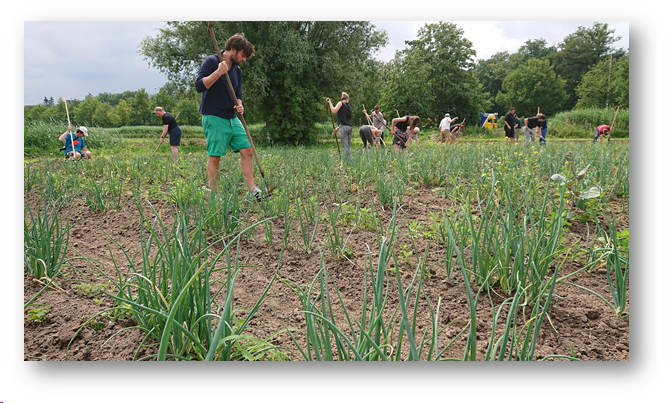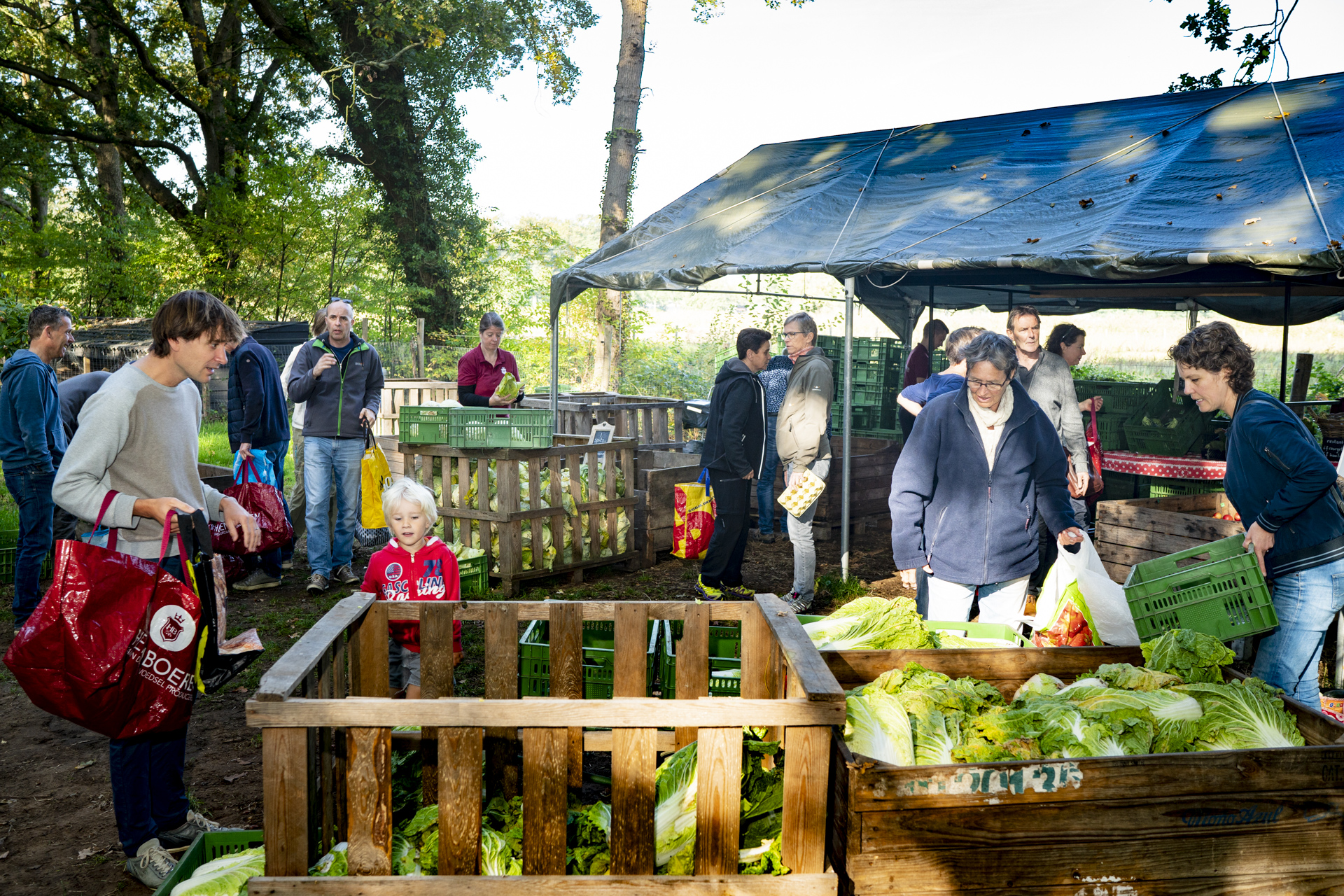Our Theory of Change
A road towards nature-driven, socially connected, economically supported food systems for everyone in the Netherlands.
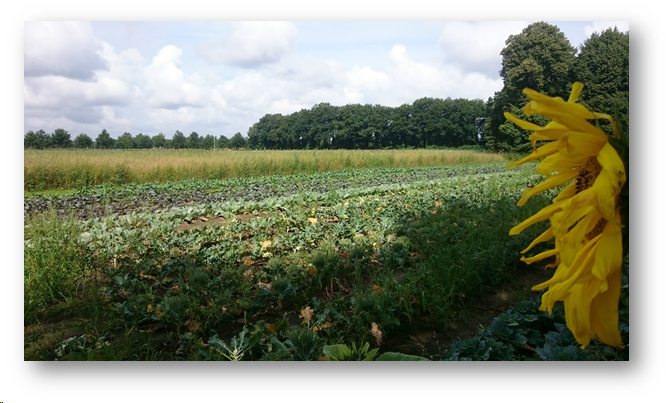
Imagine everyone in the Netherlands eating fresh produce from the land every day. Seventeen million people healthier and more alive than they are now, and experiencing the difference themselves. Imagine living in a country with fresh air and a beautiful, productive, enjoyable, liveable landscape; not just for us humans, but for animals as well. Godwits? Flocks of them, flying all around.
At Herenboeren, we do imagine it. Because it can be done. The Netherlands is located in a fertile delta and has a rich history and vast knowledge when it comes to agriculture and food production. In the past, this tradition was also characterised by a varied landscape with great appreciation for biodiversity and a wide range of plant and animal species. As a country we have therefore proved ourselves eminently capable of producing sufficient food with plenty of variety, and indeed more than we need.
The Netherlands of the Farming Communities
Come with us on a journey to the Netherlands of, say, the year 2060. What might the country look like if we had a fully sustainable, regenerative, flexible food production system designed for the long term? The picture in front of us is of a happy country where agriculture and nature conservation merge together over a large part of the Dutch countryside: 700,000 hectares where Farming Communities support the production of food by and in partnership with professional farmers. 700,000 hectares where we and our children can help with sowing and harvesting, where we can walk and picnic at weekends, where we can meet with friends, relax and enjoy good conversation. In short, a country and landscape in a natural balance; a place where people and culture form an integral part of the landscape.
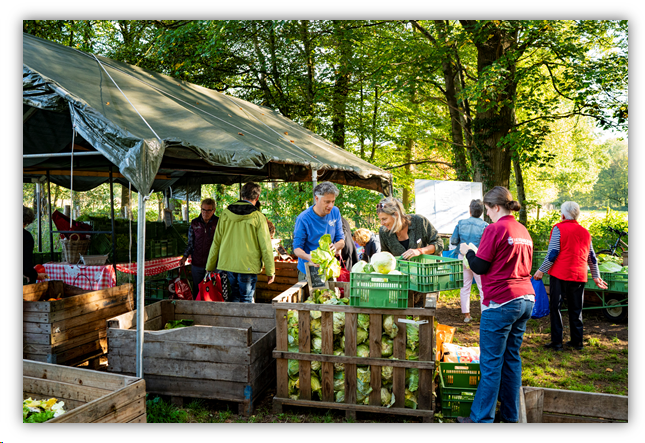
People in the Netherlands have long been looking for a country with a better balance: a country where all values matter. In September 2018, Dutch Agriculture Minister Carola Schouten set out her vision which seeks to include and appreciate different values in agriculture, such as biodiversity, soil quality and animal welfare. In practice, however, this vision does not always tally with the prevailing interests, which are mainly about maximising yields per hectare at the lowest possible cost.
Imagine if we could set in motion a movement towards 700,000 hectares of agriculture and nature conservation blended into one. A movement in which everyone can play a role. Members of the Farming Communities, farmers, investors, scientists and creatives coming together to connect their broad palette of knowledge and experience and strengthening each other in the process. Imagine hospitality, retail, food production, research, education and many other sectors coming together to create nature-driven, socially connected and economically supported forms of food production, distribution and use. With 17 million inhabitants of the Netherlands all connected in some way to the Farming Communities, we can make a huge difference. We can do this by transforming our agricultural tradition into one that makes a positive contribution to humanity, the earth and the natural ecosystem.
In boxtel and elsewhere
Herenboeren began in Boxtel in the Dutch province of Brabant in 2015. Working with each other and a professional farmer, this Farming Community has succeeded in developing a different method of food production. All while attracting great interest from both home and abroad. We are convinced that what we have achieved in Boxtel can in fact be done anywhere. Because a vast wealth of knowledge and experience has already been built up and shared, and this will continue. The movement that has matured into Herenboeren is conquering the Netherlands from the bottom up. Step by step, this reproducible concept is working towards 700,000 hectares of food-producing landscape: the Farming Communities landscape.
An estimated 35,000 professional farmers, growers and other food producers and processors committed to these communities will soon be working on those 700,000 hectares. The idea and figures have not been plucked out of thin air but are based loosely on a scheme such as Herenboeren, under which a single farmer is employed to feed a cooperative of 500 people by sustainably farming 20 hectares.
In the densely urbanised Netherlands of 2060, our countryside is energetic and bursting with interaction, variety and biodiversity. And above all, it delivers plenty of things that are of value to everyone in different ways. Nature-driven food, for example. The quality is so much better than in the early 21st century. This is because it grows in a soil that is bursting with life and has improved enormously in recent decades.
And the landscape? It has been regenerated, and has regained its human scale. The landscape is enjoyed and experienced, both lived in and lived off. The people of the Netherlands, young and old, online and offline, have reconnected in various ways with the country’s landscape and with the places their food comes from. What we eat defines the landscape where we live and work. A landscape that is cherished and nurtured, where regionally supported investments are made and where old and new values flourish side by side.
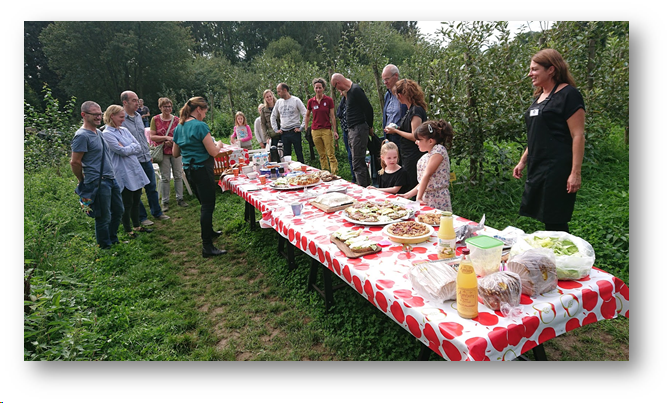
Because it can be done
Growing numbers of people in the Netherlands can already see, in 2018, that we are on the verge of finding alternatives to the food and agriculture system that we know today. The Herenboeren cooperative for one, but also the nature stewardship group bOERbossen (“Farmer Forests”), urban farms and self-picking initiatives, are fuelling a movement that aims to repair the broken relationship between people, environment, soil and food.
Herenboeren Nederland is convinced that all of these initiatives, these Farming Communities, offer inspiration and lay the foundations for a food system that is sustainable in every respect. Herenboeren’s vision for the future is that Farming Communities, together with their farmers, suppliers and other partners, will be able to use their 700,000 hectares to supply local residents with good, honest food while respecting natural values.
Come with us
The why and how are explained in this perspective. But we can’t and don’t want to make the journey alone, so we are inviting everyone who wants to join in, share ideas and take part. We believe that the way we use our land should be just as varied and strengthening as an ecosystem. In other words, no monocultures – but socially, economically and biologically diverse landscapes.
Food production in the Netherlands in 2060: Herenboeren inspires
What began in 2012 with a thought experiment has developed into a concept, a practice and a movement. Herenboeren Nederland wondered: what if everyone in the Netherlands had their own farm? What would that mean and how could it be done? How many farms would be needed? What would be the right scale? And what would be a suitable economic model and a good way to grow and distribute food along nature-driven, socially connected and economically supported lines? By designing and learning but mainly by doing as we went along, over the following years we developed the first Herenboeren Farm. A place where food production takes place in synergy with regeneration of the soil, landscape and nature, community building and economic renewal. Since then we have received dozens of requests to set up more Herenboeren Farms, both here in the Netherlands and further afield. The first Herenboeren Farm in Boxtel is up and running and, at the time of writing (late 2018), more than fifteen concrete initiatives are in development. The next Farm opens its doors in 2019.
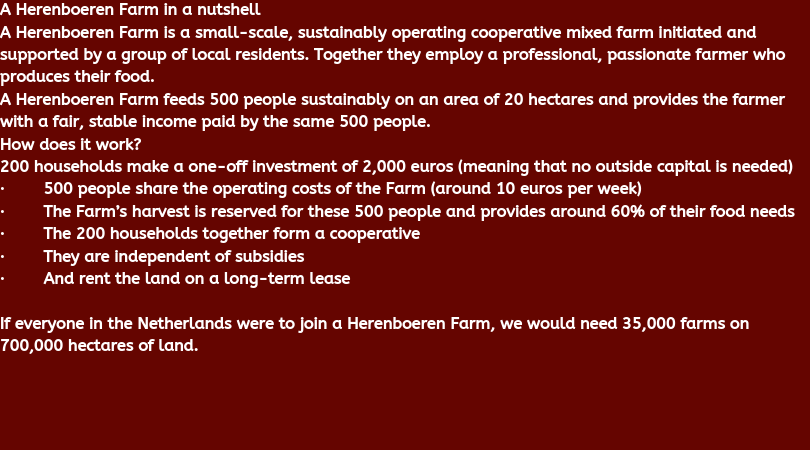
This movement shows that it can be done: everyone can be part of a Farming Community producing food in a nature-driven, socially connected and economically supported way. The approach taken is such that not only are the landscape and biodiversity restored, but society is revitalised and the economy renewed. Thanks in part to these Farming Communities, Dutch agriculture can once again be a frontrunner.
Imagine that, by 2060, 18 or 19 million people had financed and set up 35,000 farms: 35,000 cooperatives with perhaps twice that number of passionate, professional farmers taking responsibility for food production, nature regeneration and fair, transparent business practices. A large part of the Dutch countryside, around 700,000 hectares, is devoted to a fully sustainable, regenerative and flexible food production system designed for the long term. These 700,000 hectares provide venues for interacting with other people and generate crossovers between areas such as education, health, sports, recreation, leisure, enjoyment of nature and other forms of business. This creates a landscape in which people learn, explore, work, reflect and gather while surrounded by nature. What you see is 700,000 hectares of nature-driven food production, alternating with forests and orchards, heathland and grazing land, urban agriculture and many other combinations of activities that are currently rarely found in a single area.
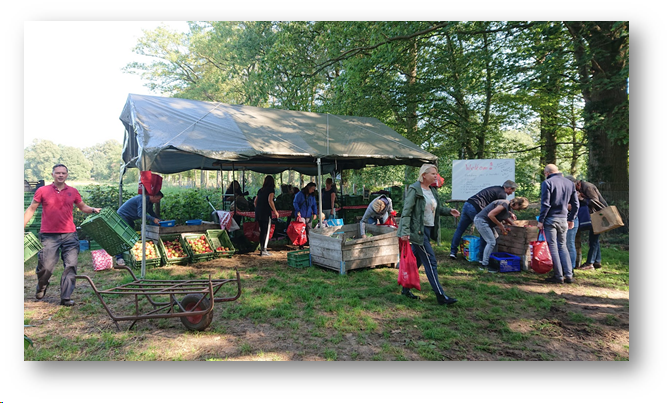
What we see in front of us is 35,000 organisations or working communities set up and run by cooperatives. By groups of people coming together to invest with a view to tomorrow; working together based on a shared vision and producing in a sustainable way, keeping their own environment liveable, vibrant and biodiverse, and cooperating to ensure a fair distribution of results, in terms of food for the community members and an income for the farmers.
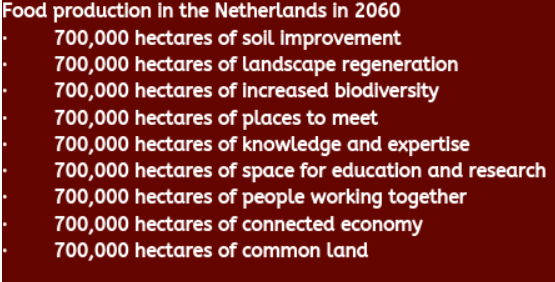
Millions of people are organised locally in cooperative communities coming together to take ownership and responsibility for their living environment. People exploring and realising how we don’t just take from nature, but give as well. Communities living in harmony with the features of the land; in an economy that reflects the real costs of our food, including caring for people and the environment in the short term but, above all, in the very long term. They look seven generations ahead. They work together with local energy cooperatives and other organisations, seeking ways to store CO2 and helping to devise and develop other methods of state-of-the-art, nature-driven building and living.
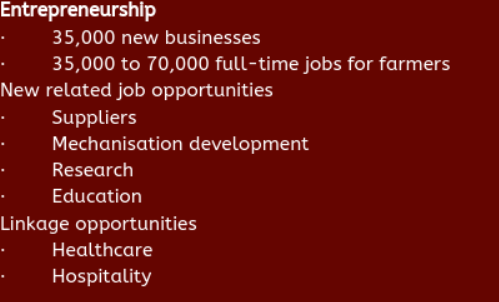
We know it can be done, but it will take more than a handful of cooperative farms to achieve this. Herenboeren can’t do it alone, and nor do we want to. The key to scaling up lies in working with other initiatives that are embracing new food systems. Because here more of the same leads to monoculture rather than to much-needed diversity. Biodiversity and cultural, economic and social diversity go hand in hand. Combining and exchanging knowledge and experience is both a prerequisite for and a guarantee of sustainable land use. It is precisely that complexity that guarantees resilience and durability; from focusing on specialisation to developing in cohesion and synergy.
We are aiming for a wide variety of community initiatives based on the following three principles:
- Nature-driven
- Socially connected
- Economically supported
This is why we are launching a number of Herenboeren knowledge coalitions. These are initiatives in which people, organisations, researchers and doers work together; working together to develop, study and learn from food production initiatives based on these three principles and organised on community-based lines.
Herenboeren knowledge coalitions: thinking by doing based on three principles
Farming Communities are based on three interlocking movements: nature-driven, socially connected and economically supported. Step by step, these three principles are encouraging a shift towards the landscape described above.
We are working to develop this in various partnerships and in our own knowledge centre. In theory, yes, but primarily in practice. Given the damage that nature has sustained in recent decades, we have no time to lose and theorising on its own won’t take us very far. But you only know if something will work when you actually do it, so we place a strong emphasis on action and action research.
As at the end of 2018, Herenboeren Nederland is already active in the following knowledge coalitions:
- WINK
- Farming Communities development and expertise programme
- Green Deal Natuurinclusief Grondgebruik Herenboeren
We are currently setting up the Herenboeren knowledge centre. Besides conducting research with others, it will also create its own experimental garden. This will be a place where we can learn and show what works and what doesn’t, where we can come together and where we can experiment, learn and conceptualise with the main goal of constantly improving our understanding and identifying what works and what doesn’t.
The Herenboeren knowledge centre is also a learning place for future farmers and parties involved in other forms of Farming Communities. What makes the centre special is that it is a sanctuary for learning, developing and working on our own and each other’s food skills.
One of the first knowledge coalitions developed a development and expertise programme in 2018. People wanting to master ways of producing food according to the three principles can participate in this programme.
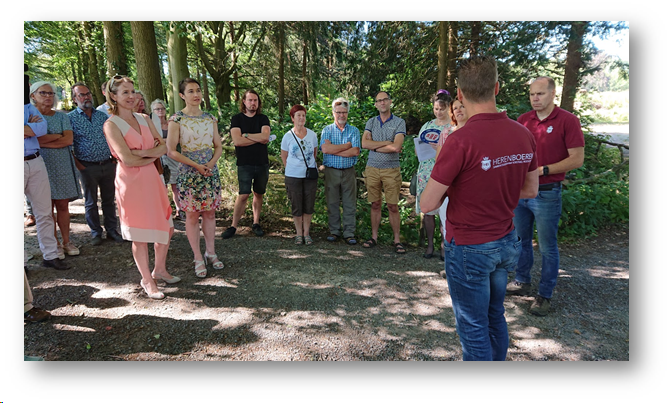
Green Deal provides answers
In de praktijk lopen we aan tegen een aantal hobbels, variërend van niet passende wet- en regelgeving tot stimuleringsprogramma’s voor landbouw en natuurbescherming die losstaan van elkaar.
In practice, we face a number of obstacles, ranging from poorly adapted laws and regulations to separate incentive programmes for agriculture and nature conservation.
The main focus of attention is the functional division that exists in land use and between sectors and disciplines. Farming Communities are characterised precisely by their integrated approach. Their effectiveness stems precisely from the overlap between these different worlds and the plurality of situations. Classing a pig solely as an indoor animal, for example, poses an obstacle to an animal-friendly, nature-driven approach. We will encounter similar issues on the economic and organisational side, for example in financing agreements (combinations of gifts and loans), taxation (combining profit and non-profit in a single organisation), and new forms of cooperatives (blending people and organisations). Current laws and regulations leave little or no room for hybrid, plural or co-creative methods and organisation types.
What would help:
- Broad use of incentive programmes, i.e. not just focusing on farmers or businesses;
- Smart implementation of the CAP;
- Adaptation of laws and regulations.
Reading between the principles
The three principles of Farming Communities are explained in more detail below. The principles reinforce each other and overlap, which is precisely where the ultimate goals become clear:
- Regenerative area development;
- Multiple value creation;
- Community development.
All of these trends are in line with what many people and organisations need and consider important in this day and age. We live in a small country that is increasingly developing the characteristics of a big city. A city in which nature, culture, agriculture, recreation and business overlap and can strengthen each other. The “2040 Manifesto” issued by Wij Maken Ruimte expresses it as follows: “We want the Netherlands to be the world’s coolest metropolis by 2040. Green, safe, prosperous and circular, so with minimal claims on water, soil, raw materials and fossil energy.”
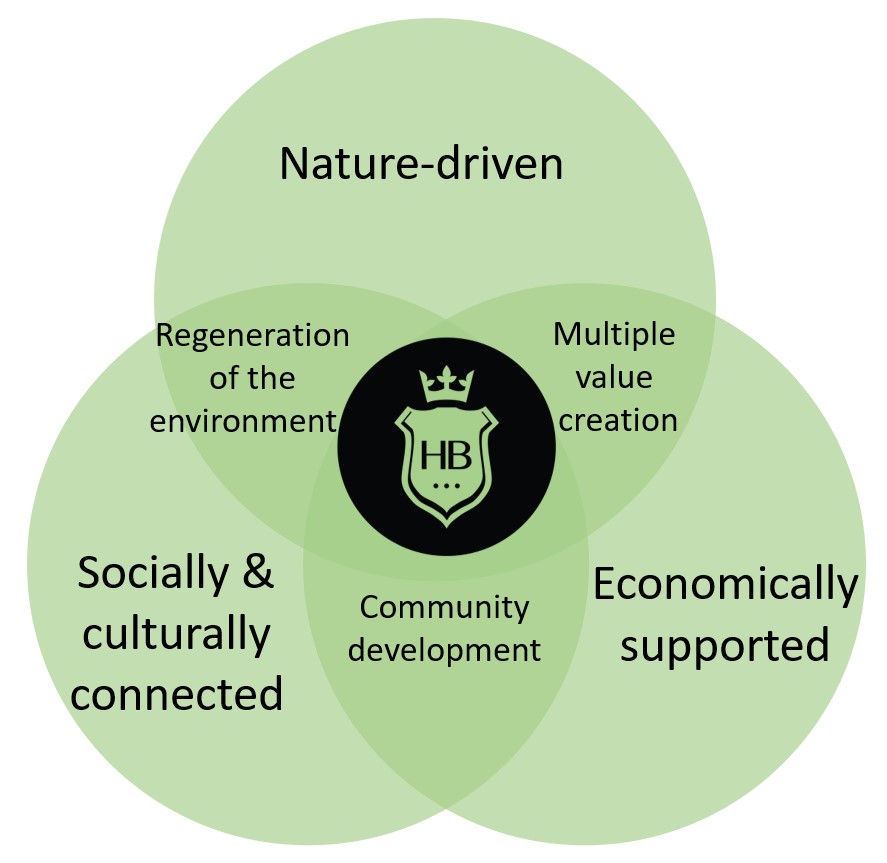
Farming Communities can help to achieve this: regenerative area development where value is created for people, nature, the living environment and the economy in multiple ways at the same time.
This is only possible if government, businesses and communities work together. To create a level playing field, it is important for people and communities to strengthen themselves and each other so they can participate as equal partners. Indeed, this is a prerequisite for getting out of the destructive downward economic spiral in which we currently find ourselves. Healthy economies have a balance between government, community and the market. In the Western world, the market is wholly dominant at present. Initiatives by people in cooperatives help to restore the balance.
Nature-driven food production systems
The starting point in a nature-driven food production system is the power and complexity, and the developing and coping capacity, of natural processes. Observe and read nature, make her work for you, work with her rather than against her; that makes the whole stronger.
Taking natural processes (above and below ground, with the whole web of relationships between plants, animals, soil, micro-organisms, etc.) as our starting point, we can eventually create a resilient, varied and biodiverse system bursting with values in a precious landscape of 700,000 hectares. This system, which is actually a crossover between what we now call “agriculture” and “nature”, can then be both maintained and developed with a minimum of external inputs.
Nature-driven food production also means focusing on the natural behaviour and living environment of animals. Just as in nature, animals play a key role in an ecosystem. They guarantee a healthy soil by supplying fertiliser, and their rooting and treading ensures that the soil benefits as a whole. Over time, nature-driven food production systems evolve into ecosystems that determine for themselves how many animals they can carry.
After all, “nature-driven” is not the same as doing nothing and “just letting the wind blow”. The professional farmer or grower is an active director in a food-producing system that at the same time aims to regenerate the entire ecosystem, including water, landscape, soil, flora, fauna and other natural values.
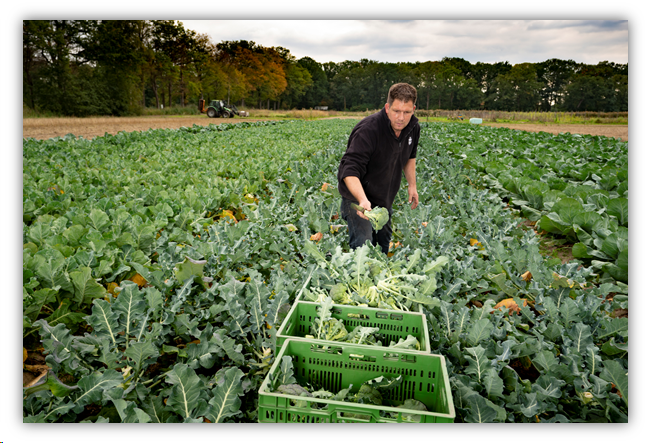
Socially connected organisations
“Socially connected” means that the Farming Communities are embedded in and serve the local environment:
- The facilities and activities in an area;
- The people who live and work there;
- The cultures;
- Local capital (in the broadest sense of the word: knowledge, money, time, attention, energy).
The local community makes these cooperatives or businesses possible, helps to devise and develop them and buys their products. These are also the people who reap the benefits of a liveable, green environment, and of the social cohesion that results from these forms of local cooperation.
The converse also happens: Herenboeren Farms are proving to be a source of new social relationships and activities.
It is not just local residents who play a role. Schools, employers, researchers, NGOs, associations and government, for example, can also contribute to and cooperate with these socially connected businesses. The focus is on having joint responsibility for our environment and our food, and taking control in creating a healthy living environment and food system. What matters here is the sense of ownership of our own food production. Making groups of consumers, the Farming Communities, directly and indirectly responsible for their own food gives the transition to a sustainable food system an unparalleled boost.
Farming Communities are not kitchen gardening groups. The communities are directly connected with and also invest in “their” farmers and growers. We can see this even today in the enormous appeal of the Herenboeren Farm in Boxtel and the exposure the collective is receiving.
Economically supported businesses
“Economy” means literally “household management”, from the Greek oikos (house) and nomos (management). It’s about the choices we make to get our house in order. The house here is more than just the things we make, buy and sell; it also encompasses the environment, the culture and the relationships that are part of it.
In short: an economy that is connected with the earth and the different societies on this earth . Economist Kate Raworth talks about an “embedded economy”. She shows how flows of materials and energy relate to every area of our lives and reminds us that we are more than just workers, consumers and owners of capital.
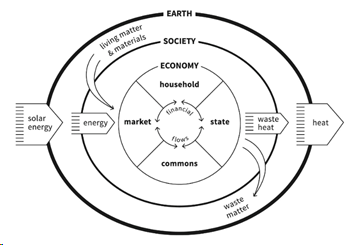
Figure 2: Embedded economy, Kate Raworth
Taking care of the land, each other and the bigger picture forms the basis of every Farming Community and shows how we can evolve from an economy of “takers” to an economy of “care takers”. In practice, this means reversing the supply chain. We start with the people who live in an area and in that context take responsibility for their own food production. This means that the farmer earns a fair wage and that food and a healthy living environment for the many are more important than monetary gain for the few. We believe that sharing is more important than having, that using is often more convenient than owning, and that a balance exists between individual and collective benefits.
Land is secured for seven generations and its financial value is kept outside the enterprise. We are looking for ways to make land a common good again. We play with traditional roles, so consumers also become producers; we shorten supply chains and we value the farm and everything it yields, not just its individual products. And finally, we are not looking for big-bigger-biggest, but for the right size. A size where people can get to know each other; a size that is enterprising and sustainable.
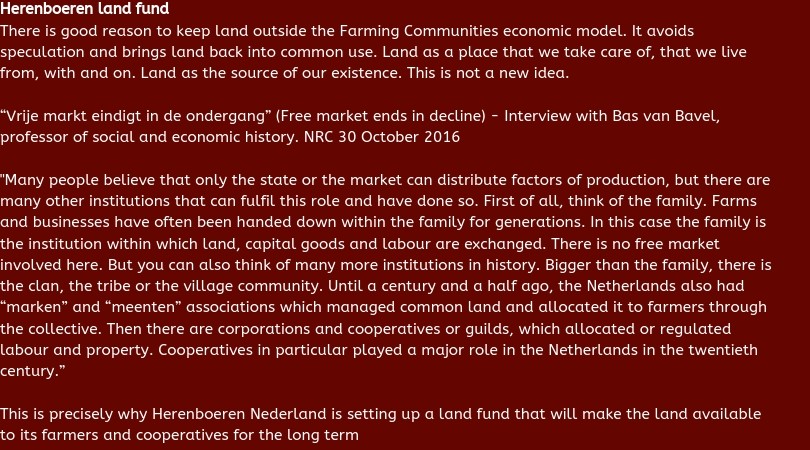
Why is this such a good idea?
- The Netherlands wants to remain a leader in the world of food production
- We have the logistics and distribution infrastructure in place
- We have the best and brightest universities
- As a small country we understand better than anyone that we need to make clever combinations
- And we are fantastic entrepreneurs
With the Farming Communities taking the lead, neglected relationships between nature, business and society are being dusted off and restored. This is generating a wave of new connections, crossovers and socio-economic experiments in which food, nature, energy, education, research and entrepreneurship come together. We can hardly begin to estimate the potential and impact.
In the densely urbanised Netherlands, our countryside is energetic and bursting with interaction, variety and biodiversity. And above all, it delivers plenty of things that are of value to everyone in different ways.
And it is an inclusive system, because everyone can participate from day one – just like they can in Herenboeren. New relationships emerge, based on restored values and new contacts, giving rise to innovative, economically valuable developments. Everyone can choose today to do things differently tomorrow:
- Individuals and families as members of schemes like Herenboeren or bOERbossen;
- Government in adapting laws and regulations and incentive measures;
- Researchers in knowledge development;
- Education in unlocking knowledge and expertise;
- Entrepreneurs in developing linkable initiatives;
- Farmers in adopting new food production practices;
- Investors/philanthropists in the land fund;
- Developers in developing tools for “human scale mechanisation”;
- Advisory agencies in providing information;
- Retail and logistics businesses in fine distribution.
With broad societal support, political willingness and a touch of blue-sky thinking and the courage to let go, we can set off together on the road towards a nature-driven, socially connected and economically supported food system.
In Boxtel the first Herenboeren Farm is up and running and is almost certain to be joined by two or three more in both 2019 and 2020. After that, things will probably snowball. But let’s put our shoulders to the wheel right now: this is an invitation to the whole of the Netherlands to join in and get behind this bottom-up movement. It’s not a question of whether it’s possible; it’s a question of whether we want it. Herenboeren is going for it. Together, we can go faster and make our country a little bit more beautiful.
We therefore invite everyone to join this movement, everyone in their own way, based on their different roles and responsibilities.
Herenboeren Nederland Foundation
